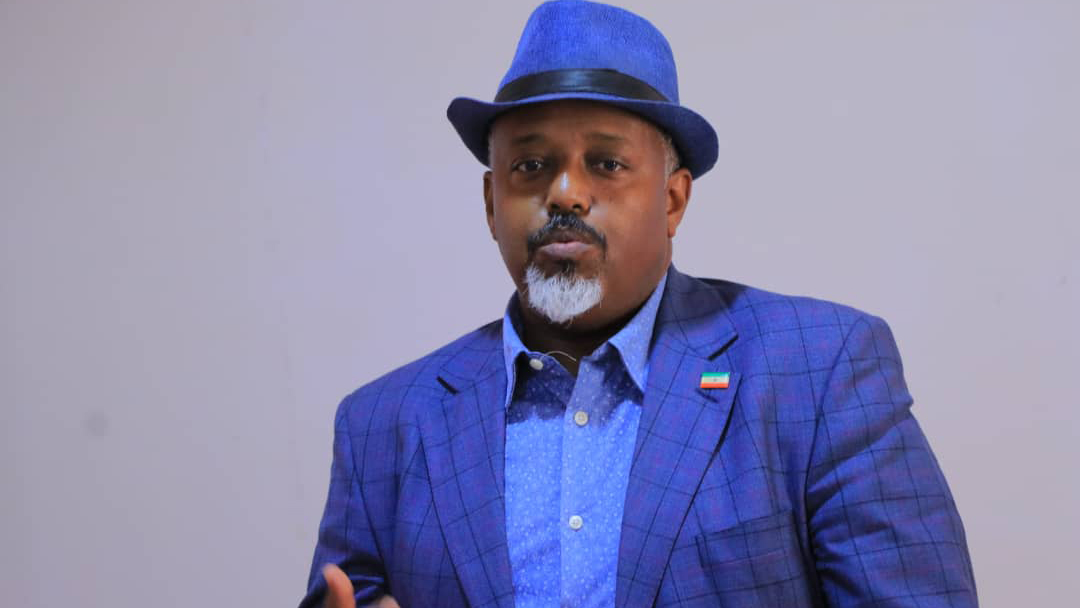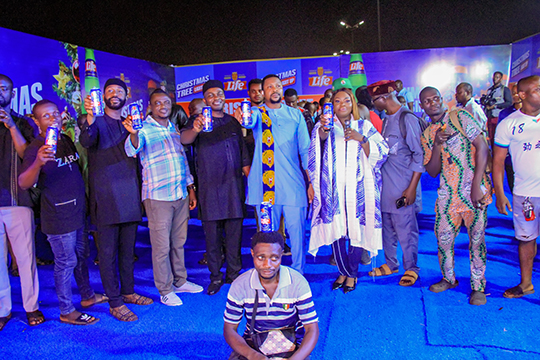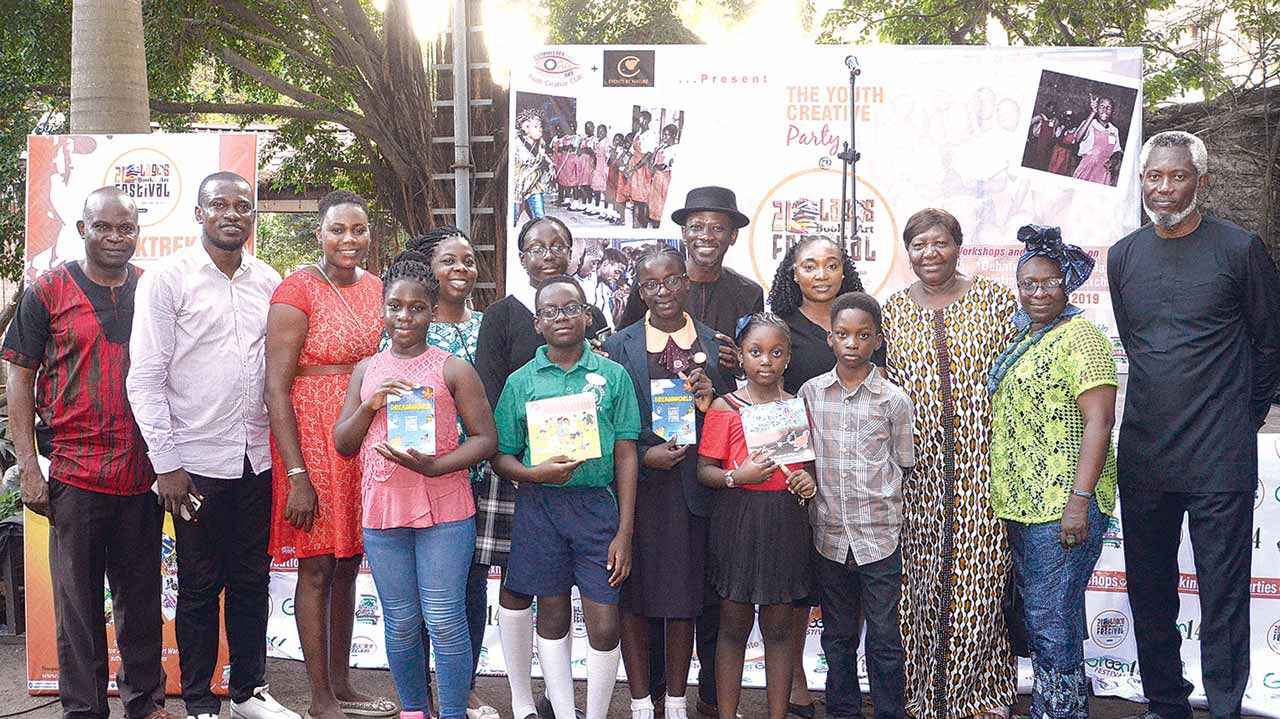
Festival to me is a period set aside for wild, sometimes idiotic celebrations. I had never attended one. What I saw from afar were jobless people whining, gambling and whoring as though life were a bed of roses. Therefore, attending festivals was not my thing because I thought there were better things to tackle with my time and attention.
But on 18 October 2019, my philosophy about festivals began to change when I received a formal invitation from the Programme Chair of the Committee for Relevant Art (CORA), Mr. Jahman Anikulapo to attend Lagos Book Art Festival, which he directs. I thought to myself: ‘This is Mr. Jahman, he wouldn’t invite me to a meaningless thing because he is not a meaningless man.’ So, I made up my mind to be a part of the celebration. Besides, I believed so much in the idea of Freedom Park, because every of its products in the past few years has undoubtedly been illuminating. I almost missed the festival, but I am glad I didn’t; for, I would have lost a lifetime opportunity.
With the theme ‘Emerge: Breaking into the New,’ this year’s festival addressed new mores in the way culture and its vehicles, the arts, affect human actions and progress of society. Most of all, it addresses the issue of reading in Nigeria, channeling ways in which the culture could be deepened to ensure participatory democracy by the citizens. There were several intriguing and illuminating conversation panels, where guests discussed books, art and ideas, spotlighting their meaning as they affect he process of nation building and emancipation of the human family.
I am personally passionate about youth opportunity and development; so, my focus in reflecting on this festival tagged ‘Feast of Life and Ideas’ will try to check how the various events staged in the course of the festival affect the youth, the leaders of today and tomorrow.
The seven days’ art’s feast started on Monday, November 4 and ended on Sunday, November 10, 2019. In particular, the children and youth section, which started with the four-day CORA Youth Creative Club (CYCC) on Monday, November 4 at the Green Desert section of Freedom Park, was educative, empowering and inspiring. Young person desirous of growing up to be a resourceful person and an asset to society should not miss the event.
The festival’s opener, which was dubbed the ‘Libation’ had indeed been staged by a youthful organization, Praxis Hangout, anchored by the youthful Tee Jay Dan, editor-in-chief of Praxis Magazine Online. The stimulating session was on Literature in Indigenous Languages and Translation. The second part of the session was held in the late evening of same day, where poets and storytellers shared their works in a moonlight storytelling ambience. In between the two related sessions was the BookTrek, which paraded over 30 authors – young and old — reading from their works to a live audience. Of particular interest were the four kid authors –- age range 4-10 — who also read from their books.
In all, over 65 per cent of the 52 events that featured in the festival was anchored by youths from age 25 to 40; and this signalled a good prospect for the future of the festival, which is the longest running project of its nature in the country, and perhaps the continent.
The youth-focused programme
Friday, November 8 witnessed the beginning of the Green Festival, the associate festival of LABAF, jointly organised by CORA and Children And The Environment (CATE). The sage and grand word master in person of Professor Babatunde Akinwande Oluwole Soyinka was with us throughout the event on Friday, November 8. He spoke to the gathering of over 300 students on the significance of knowledge acquisition to nation building. He challenged the young ones to always hold the adults, including their parents, to account as actions they take affect their today and their future.
Cultural icons of repute, people who have dedicated their existence to serving humanity and have invested their time in literary activities were in attendance, interacting and mentoring young people. We had the veteran actress and culture advocate, Mrs. Taiwo Ajayi, dramatist, culture communicator, Ben Tomoloju, and theatre and global culture scholar, Professor Awam Amkpa, popular screen actress, Monalisa Chinda-Coker, and actor, motivational Femi Jacobs, author of the motivational memoir, The Rise – both of who mentored children and students on the importance of reading and education. Mr. Treasure Bayode Olawumi, who holds the Guinness Book of Record’s award for Longest Reading session (123 hours in six days), was also on hand to encourage the youth section on the importance of reading to shaping career and personality.
For every youth, who is confounded and keeps asking, “what can I do to make Nigeria better? How can I contribute my own quota?” Lagos Book & Art Festival is a carnival you should never miss. Freedom Park is a place you should never leave while reading is a culture you should never be lax about.
Conversations:
The conversational part of the book segment of the festival focused generally on the 2019 theme of ‘Emerge’, which kicked off on Wednesday, tagged ‘Leaders Are Readers’, which featured two leaders on the economic and social spheres of Nigeria: Dr. Yemi Ogunbiyi, a popular media tycoon, who is the incumbent Governing Council Chairman of Obafemi Awolowo University, and Mrs. Adepoju Adepeju, the immediate past Commissioner for Agriculture, Ogun State, and former Managing Director of some blue-chips companies, including United Trading Company, UTC. Moderated by Dr. Reuben Abati, public intellectual and former Chairman of The Guardian Editorial Board, the session had the two guests sharing their preferred reading materials, while spotlighting how devoted reading and consistent push at knowledge acquisitions helped to shape their career and accomplishments, just their their worldview got expanded.
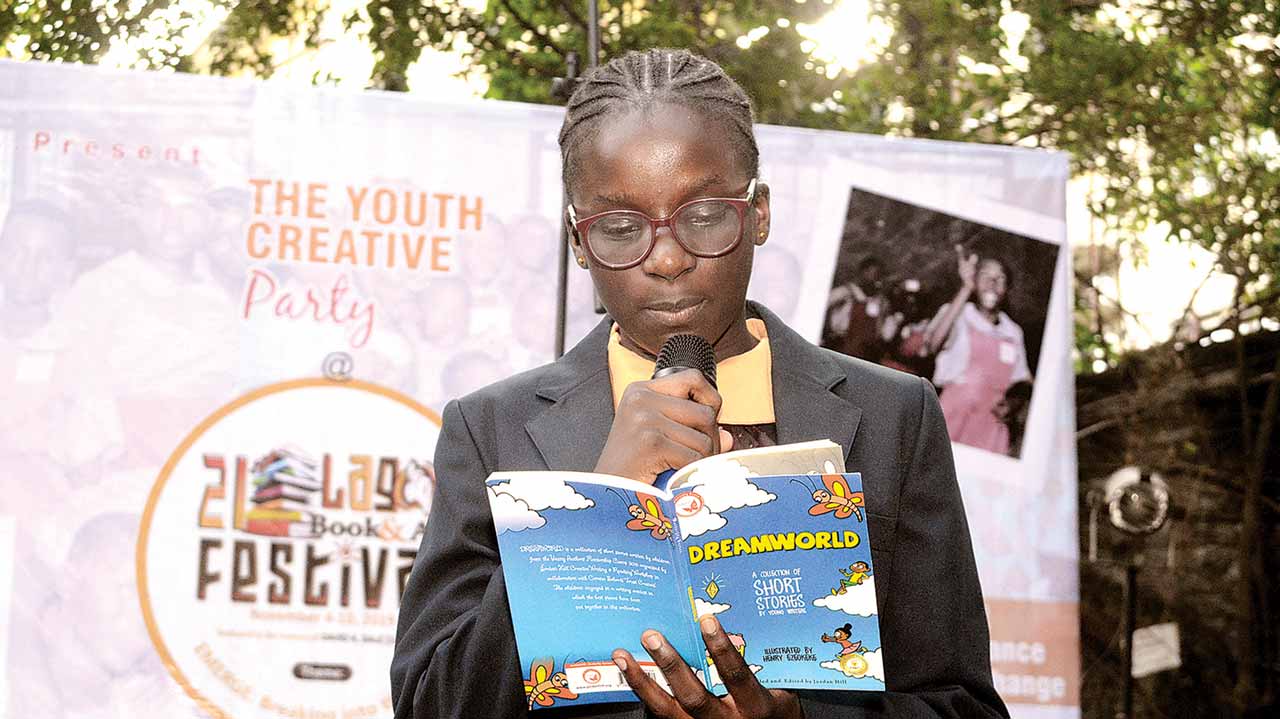
On Thursday, November 7, the 9th Publishers Forum was held in the conference room of Goethe Institut. The focus was how to get 200 million people reading in five years, and it featured about 80 publishers, writers, book enthusiasts, literary activists – all sharing ideas and comparing notes about how the culture of reading could be deepened in society to get more people engaging with the written text and thus encouraging mental capacitation. The adult speakers seemed to be admonishing youths: ‘Our time is up; we are rounding up; it is left for you to act for you will suffer what our generation did if you don’t act. And think; you die the day you stop thinking.’ How do we act? Is it not by reading, thinking about what you have read and acting on what you have thought? Now that we know reading is the only essential matter, how do we get more of you reading. Functional and enlivening as the Forum was, it was also full of severe, head-aching big grammar.
The conversations, described as extended dialogues on the theme, continued on Friday November 8 with a keynote by Awam Amkpa, the renowned global networth Professor of Drama and Social and Cultural Analysis at New York University (NYU). Moderated by the poet, book activist, Maxim Uzoatu, in the keynote, Amkpa dwelt on how the citizens should own their narrative and be consistent in holding their leaders and rulers accountable. He encouraged young people to see themselves as citizens of the world, who should not be shackled by the boundaries created by the odds in the system in which they found themselves. Board member of CORA, Aunty Taiwo Ajai-Lycett, who chaired the session, excoriated Nigerian politicians for their perennial irresponsible actions, which further create problems for the socio-political and economic development of the nation.
Awam’s keynote which received a loud ovation soon devolved into the fascinating ‘Literature and the Return of Hope’, which canvassed that writing and reading could indeed lead to the restoration of hope in a beleaguered nation as Nigeria. Awam noted that in the midst of the madness that characterises Nigeria’s political landscape, only such offerings as LABAF and other cultural shows offer sanity and ostensibly subvert the system being entrenched by the political class. He, therefore, called such cultural outings and writings that emanate from Nigerians as insurgency in an environment that shuts out education and encourages corruption. He further noted that there was dissonance between the cultural outings in the country in terms of writing and others and the space that receives it.
“In Nigeria, we live in an informal world (LABAF and other cultural offerings) that is more functional than the formal world (government) that has messed things up,” Awam stated. “Nigerians have become the ragged trousered philanthropists who are being screwed up daily, but who also find it in their heart to be generous to those screwing us up.”
This featured reading, review and discussions around three books: Utopia for Realists and How we can get there by Rutger Bregman; Afonja: The Rise by Tunde Leye and We Were Eight Years In Office? by Ta-Nehi Coates. The session was moderated by Komolafe Kayode, Deputy Managing Director of ThisDay newspaper, and featured in the conversation, were culture critic, Kayode Faniyi, author Tunde Leye and literary activist, Kolawole Oluwadamilare.
The second seminar for the day, titled ‘Readers Assembly’ dwelt on the theme, ‘Obstacles to Emergence,’ and discussed the books like Do not Die in their War, a riveting critique of Nigeria’s polity and leadership by Dele Farotimi; The Old Drift, by Namwali Serpell and Pat Utomi’s seminal reflection on Nigeria’s awkward political system, Why Not? Citizenship, State Capture, Creeping Fascism and Criminal Hijack of Politics in Nigeria. This session was heated in content and character, as it generated lots of reactions from the audience, especially with the outspoken, no-holds-barred activist, Farotimi, a former student union leader of Lagos State University in attendance. Moderated by the poet-activist, AJ Daggar Tolar, the session also featured reviews and discussion of two of the books by the journalist, Aderinsola Ajao and the writer, Femi Onileagbon.
On Saturday, more conversations were held around the theme ‘Emerge…’ An exciting session was, however, the intergenerational dialogue between older and younger writers, which showed how each set had handled crises brought by instability in the polity, especially military interregnum and the fall in the economic fortunes of the nation. While the older writers, comprising Omowunmi Segun, writer, literary activist; Toni Kan, writer, online journal publisher and Chuma Nwokolo, writer, literary activist – tackled the first subject: ‘How we wangled through – The collapse of the Book Industry, the poetry of hunger and the Jackboots of the military dictator’ as moderated by Molara Wood, writer, culture journalist, the younger writers engaged the topic, ‘How we have Emerged – The new architecture of Literature, Publishing and the return of Readers’ as moderated by Yona Masade, book editor, literary activist, and featured as discussants, Sylva Nze Ezigbo writer, literary activist, Princess Irede Abumere, writer, literary activist, and Rufai Oseni, writer and broadcaster.
Also, a colloquium on ‘Narrative of Emergence’ was anchored by the writer and lawyer, Aduke Gomez. It featured reading, review and discussions around three books, Michelle Obama’s Becoming; My Promised Land: The Triumph and Tragedy of Israel, by Arit Shaviz, and the festival’s star book, On Earth We are Briefly Gorgeous by Ocean Vuong. It had in discussion, the culture critic, Jerry Chiemeke, the culture researcher, Benson Eluma and the writer, Wilfred Okiche.
Another colloquium on Saturday afternoon took on a more positive outlook, as it treated the theme ‘Breaking into the New,’ and featured discussions around two books: Entrepreneurship: the SLOT Ways by Nnamdi Ezeigbo and Start-up Nation by Dan Senor and Saul Singer – both looking at how sheer human determination and innovative thinking have helped bring nations out of darkness and economic stagnation. Regrettably, Nnamdi Ezeigbo, who had been well promoted as a participant in the panel, could not attend, but Oris Agbo and Dipo Ogunbiyi, both literary critics, gave a brilliant discursive session as marshalled by the knowledgeable anchored Deji Toye, the writer lawyer.
Illuminating conversations never seemed to end ate LABAF, as Sunday had its fair share, starting with the ‘Young Writers/Readers Parliament’ session in the morning, where young writers and readers had opportunity to express themselves, as well as discuss the challenges they have towards an active reading life. The session was inspiring seeing the young people in action, speaking and networking freely and demonstrating their skills in reading. The older folks took the backseat and watched their children ventilating on the idea of knowledge acquisition and education. The youths were also opportune to watch Dancing Mask, a well-made documentary by youngish Tee Jay Dan and his Box Office Studio team on the 38-year old journey of the Association of Nigerian Authors (ANA). Thereafter came the presentation of Funmi Ilori, another young person, who had been investing her time and resources indoctrinating children in the spell of writing and reading through her i-Read Mobile Library Project. Ilori’s project, vision and commitment, is so inspiring, and gives one hope that Nigeria is full of good, selfless people.
The ‘Key to Knowledge Economy’ seminar, which featured Keith Richard’s new book, Not Quite an Insider, was perhaps the hottest session in all of the panel discussions as speakers, including Ajai-Lycett, Kayode Komolafe, Samuel Kayode Aiyenugba, Toyin Akinosho (moderator) and others tore through the content of the book, and gave critical interpretation of some of the contentions in the book. Obviously, Richards’ perceived, sometimes sweeping assumptions, about the character of most Nigerians did not go down well with many of the contributors, and this fact was brought to his attention, even as he participated via Skype.
The session devolved into Art Stampede, the 28-year old (started in June 1991) quarterly “Artists Parliament” project of CORA, which focused exclusively on how to revive reading culture. Deftly handled by the writer, Chuma Nwokolo, the session showed that there is so much work that needs be done to encourage Nigerians to return to reading. The first thing to do, according to speakers, is to revamp the educational sector, such that education is prioritized by governments at all levels. The session, however, gave special recognition to ongoing private initiatives towards reigniting reading as a staple. Two projects were showcased: ‘Hanging Libraries,’ represented by Oluchi Buchi-Njere, project manager, and Ilori’s iRead Mobile Library. It also had contributions by Dr. Kofoworola, who teaches English at the University of Lagos, who, having lamented the poor attitude of students to reading, suggested that school authorities should be innovative in the way they teach students, so that reading and books in general would gain greater favour with the young ones.
… A Festival For Youths
The Green Festival, which started 14 years ago, kicked off with a huge gathering of students from as many as 30 schools storming Freedom Park on Friday, November 8. Also held at the Green Desert segment of the park, it looked like a continuation of the students’ events that had started since Monday under the aegis of CORA Youth Creative Club (CYCC), but the agenda for the Green Festival was different this year, as it concentrated on campaigning for preservation of the environment, using books and the arts as instruments.
Founded and coordinated by the lady fondly called Green Queen, Aunty Sola Alamutu, the Green Festival had children and students reading from books. Authored by mostly young people, about four of them as young as six years old(!). It was such a hope-giving programme as it shows that young Nigerian are also writing.
As had become traditional with LABAF programming, the Green Festival had a lead celebrity mentor in the person of the popular screen actress, Monalisa Chinda Coker, who anchored My Encounter with the Book, also known as The Book in My Life series.
The session is designed as a mentoring programme to encourage young people to develop the culture of engaging with written texts. The actress spoke passionately to the children and students about how her encounter and engagement with literature has helped to shape her personality and her career. The following day on Saturday, another celebrity mentor, the actor Femi Jacobs engaged the children and students. He used his recently released memoir, Rise, to counsel the young people on how they can rise above life’s adversities to become good, accomplishing citizens. Jacobs, who graciously had to steal time out of a shooting engagement to anchor the mentorship session, carried the children along with the story of his life, which was indeed full of very challenging experiences that at a point made him become a ‘street kid.’ He told the children that their present state was much better than his when he was a child but today, he is an achiever. The actor also gave his book out as gift to some students.
Also, winner of The Nigeria Prize for Literature 2019, children’s category, Mr. Jude Idada, featured in the children’s section of Green Festival in what was termed ‘Writing the Future’, where he spoke about his writing career and style and how his winning work, Boom Boom, came into being. Other writers in the contest such Anote Ajeluorou, author of Igho Goes to Farm also featured and read to secondary school students as part of the programme.
Art Projects
Visual arts had a robust feature at LABAF, perhaps the biggest since inception with nine separate events mounted. It started on Monday with the opening of two major exhibitions around the 85th birthday of the Nobel laureate, Wole Soyinka. The Festival director and CORA Programme chair, Anikulapo, said the two exhibitions had been designed to wrap up the yearlong celebrations of Soyinka’s birthday. The lead project was the Wole Soyinka: Timeless Memories: Elastic effects” mounted on the ground floor of Kongi’s Harvest Art Gallery. The project sought to fathom and exhibit, from the purview of the sage himself, 25 most aspects of the old boy from Abeokuta to becoming the icon the world apotheosizes today. The Art project was curated by Adebowale Damola of Asiri magazine. There was also the 85 verses for Wole Soyinka, produced and curated by Femi Coker of Femi Coker Art Warehouse from Badagry, and was mounted at Heroes’ Fame Walkway area of the Freedom Park. Soyinka paid a private visitation to the exhibit on Friday, November 8; and it was here he condemned the pervasive incidences of ‘Fake News’, and abuse of privacy through social media, saying that he had been a serial victim of the two vices.
The visual arts segment continued on Tuesday, with presentation of a book on the art and career of Nsibidi sign and symbols adherent, Victor Ekpuk, edited by the famous professor of history, Toyin Falola, and presented by the renowned collector and art patron, Omooba Yemisi Shyllon. The gathering was qualitative and the discussion that heralded the presentation was enlightening about the artist’s works and artistic philosophy. And it featured such tested speakers as Dr. Kunle Filani, Jumoke Sanwo, and Prof. Jerry Buhari.
On the same day, a seminar superintended by the globally renowned art and architecture sage, Demas Nwoko, in whose honour a symposium was held. It was sheer pleasure to share such quality moments with the enigmatic artist, one of the famous members of the Zaria Art Society, sometimes called the Zaria Rebels, including Bruce Onobrakpeya, Yussuf Grillo, late Uche Okeke and others – fathers of contemporary Nigeria artists.
Also, the festival’s primal Art Seminar was held on the theme: ‘30 Years After the Boom,’ which traces the trajectories of developments in the visual arts scene since the boom of the mid-to-late 1980s that produced most of the popular, and resonant visual artists of today. Listening to this session was a reminder that Nigeria had once had a bubbling art scene that produced a generation of well-honed and well-travelled artists who have been competing fairly in global art circuits.
The seminar was dedicated to celebrating the 60th birthdays of two key members of the generation — Kunle Adeyemi and Buhari – both practicing artists and art teachers.
Another art project was the And the Centre Refuses to Hold: Homage to Things Fall Apart @60. It had a collection of paintings and multi-media works inspired by Chinua Achebe’s classic novel. Curated by Chuu Krydz Ikwuemesi of Pan-African Press and Sankofa Centre for Art and Heritage, the exhibition, mounted in the museum section of Freedom Park, paraded about 44 works by 18 artists, and was formally opened on Wednesday, November 6. Soyinka, who had been designated Special Guest of Honour at an earlier showing of the exhibits at thought Pyramid in Victoria Island, Lagos, had a private viewing on Thursday, November 7. He had requested that he wanted a private moment with the works, ostensibly with his late friend and comrade-in-writing, Achebe. The opening was preceded by a conversation, which examined the content of the globally renowned novel in the context of the social issues it addresses as they relate to underdevelopment, dehumanization, culture and pervasive intolerance among Nigerian. It also reexamined post-coloniality in Africa, looking precisely at the struggles of most African nations.
Two performance artists – the world renowned Jelili Atiku and his protégé, Yussuf Durodola, also thrilled guests to the uniqueness of their post-modernist art. While Durodola performed his Majele: When the Load is Returned to the Owner, the Rest is the Rest on Thursday, November 6 to the delight of guests, the master artist, Atiku, on Saturday, November 9, took Freedom Park neighbourhood by storm with his E don Tey Wey We Dey, which took off from the park and travelled the busy Ganiyu Smith-Campbell Streets amidst loud ululation by surprised or ostensibly shocked residents, motorists and okada riders. It was a carnivalesque experience as hundreds thronged the streets as audience members as he made his way back to park. The expressions on the excited faces of children and students when he took his act to their midst at Green Festival said it all. Before his performance that Saturday, Atiku had presented the documentary, The Disciples of Marcel DuChamp, a fascinating film about a community-based site-specific experimental project that was held by a group of international artists with 65 inhabitants of rural town, Les Escaules in Spain during the LaMuga Caula Festival dedicated to the French Modernist, Marcel DuChamp.
Poetry Performances
LABAF gave ample opportunity to poets to express their art. It started with the Poetry of Arrival session anchored by Poets in Nigeria (PIN) in the evening on Tuesday, November 5. It was a mix of poetry and palmwine, as guests listened to young people expressing themselves in riveting poetic offerings with adults and youths as guests. It was coordinated by Eriata Oribhabor, poet and founder of PIN, who said the idea was to position poetry as a veritable form of literature through which citizens could engage with the leaders in the polity.
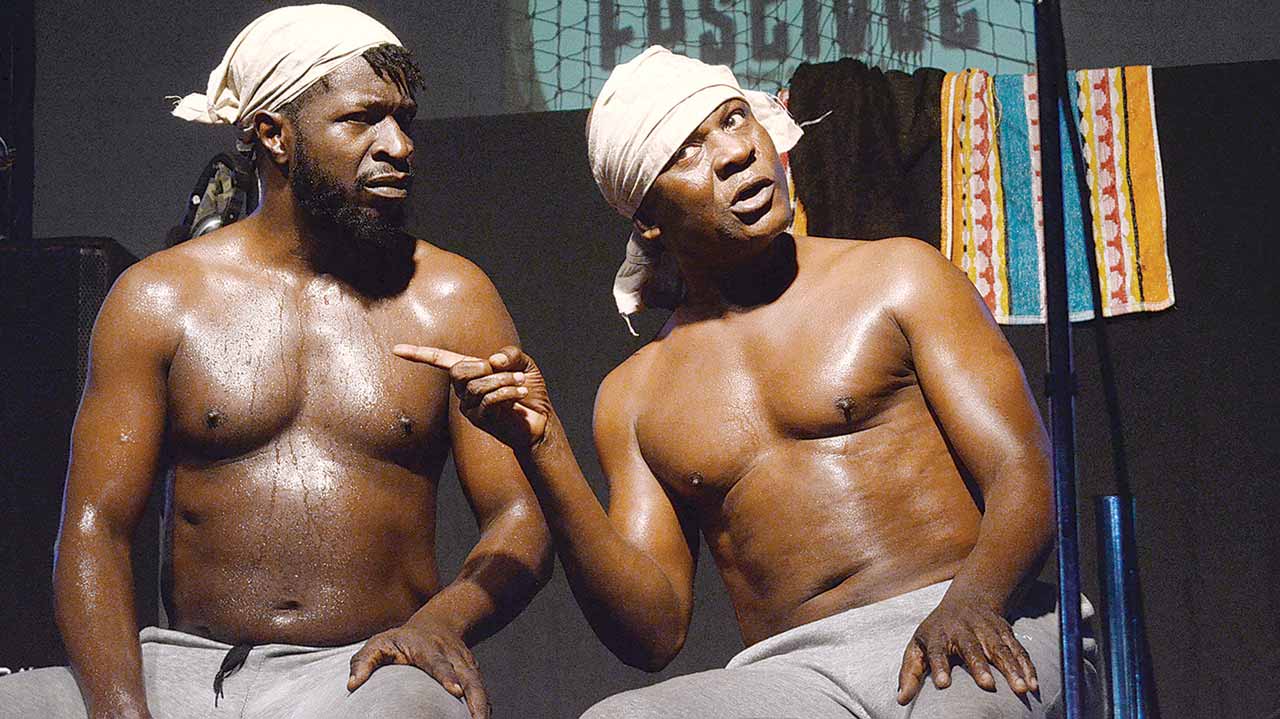
On Thursday, it was the turn of the Griots & Bards, anchored by the much beloved poet, Adebola Afolabi, popularly called RezTHAPoet. This was poetry and storytelling set in the mode of ‘moonlight tales,’ and it also featured discussion around topics that are of deep interest to youths. The last poetry event was held on Sunday, titled 1000 Poets for Change, which objectives was to see how views of poets could help to influence the direction of society and help redeem humanity from the path of political and economic turbulences. Though there were many young people who wanted to read, the time was too short as promoters of the final events of the festival, the Sakara Music Revival project were already heating up to start. It is advised that LABAF programmers should give greater time to the particular programme so as to encourage free expression by young people. Well, your truly, had opportunity to present a poem on Mama Africa, and it was well received judging from the applause that trailed me back to my seat… yeeeeeah!!!
Drama:
LILE poetry, drama also featured. Aside the agit-prop pieces such as MAN’ster (think “Man as Monster” by Illuminate Theatre from Bariga), there was also Join Bodi, a street, guerilla theatre by Kininso Koncepts, which canvased peace and unity after the rancorous electioneering season in Nigeria. It seeks to conscientize the people about not allowing politicians to continue to divide them through deception and sponsorship of violence. The runners of DePark Theatre – Ozxygen Koncepts and One Six Production – presented their masterpiece comedy, Wat’s Dis All About, an adaptation of South Africa’s legendary apartheid-era drama, Sizwe Bansi is Dead. Directed by Toyin Oshinaike, who also performed alongside Toritseju Ejoh, the drama got the over 200 guests gathered in the Food Court reeling with laughter, even as they were compelled to think through the various troubles Nigeria is facing.
Capping the drama content of LAFBAF 2019 was the play Jankariwo, Ben Tomoloju’s masterpiece, which premiered in 1985 in the thick of military regime but escaped the usual jackboot clampdown of the boys in khaki. Performed in the presence of the author and other veteran artistes, including Aunty Ajai-Lycett, the performance by members of award-winning troupe, Crown Troupe of Africa, drew endless applause, as it was a good example of total theatre in content and form. Jankariwo, directed by Segun Adefila, indeed captivated the audience on that glorious Saturday night, November 9 at the Amphitheatre.
The series of performances was capped with a night of Sakara Revival music concert, which gave a take-away to both the aged and young alike, who moved majestically to the bluesy melody and rhythm of the still highly treasured old music form.
Honours For Culture Heroes And The Departed
THE festival also honoured the finest in Nigeria’s cultural production life. The list included coctogenarians, playwright, Soyinka (85), actor and filmmaker, Lere Paimo (80), musician, Tunji Oyelana (80), and actor, Segun Sofowote (80). Others were poetry festival curator, Adebayo Lamikanra (70), and those just hitting the diamond age: architect, Theo Lawson, culture administrators, George Ufot and Aremo Tope Babayemi, theatre artistes, Segun Ojewuyi, Mahmoud Ali-Balogun, Norbert Young, Edmund Enaibe, Moji Bamtefa, Awam Amkpa, and visual artists, Kunle Adeyemi, Jerry Buhari, and Olu Amoda.
Reverence was also paid to the memories of departed heroes of the creative industry in a session dubbed ‘Night of the Ancestors.’ Those remembered were Bisi Silva, Molara Ogundipe, David Dale, Okwui Enwezor, Stella Oyedepo, Frank Okonta, Pius Adesanmi, Paul Emema, Jide Ogungbade, Eddie Ugbomah, Idowu Nubi, and Olakunle Olasope.
The festival also featured some externally curated programmes, including the Yoruba Lakotun by the Peo Davies Organisation, a session that was conducted throughout in Yoruba language and, which had Soyinka making a cameo appearance during which he urged educational authorities to ensure that the indigenous languages are given prime attention in educational curriculums. The presentation of the book, Silver Lining, a collection of poems, short stories, essays by eminent members of the literary community, who are members of the Nigerian PEN and other such programmes.
LABAF, indeed, proved to be a platform for creative artists and culture producers to showcase their various projects, especially once such projects deal with the core objectives of the festival – campaign for literacy and human capital resources development of the country and the continent. It is much in the “nature of an African Festival in which everybody brings his or her ware to the open space for communal sharing and participation”, according to the Festival Chair, Anikulapo, who also reminded that the festival aims to live up to its description as the “biggest cultural picnic on the continent of Africa.”
* Multi-talented and skilled writer and performer, Oreofe Precious blogs at https://oreofeprecious.wordpress.com




